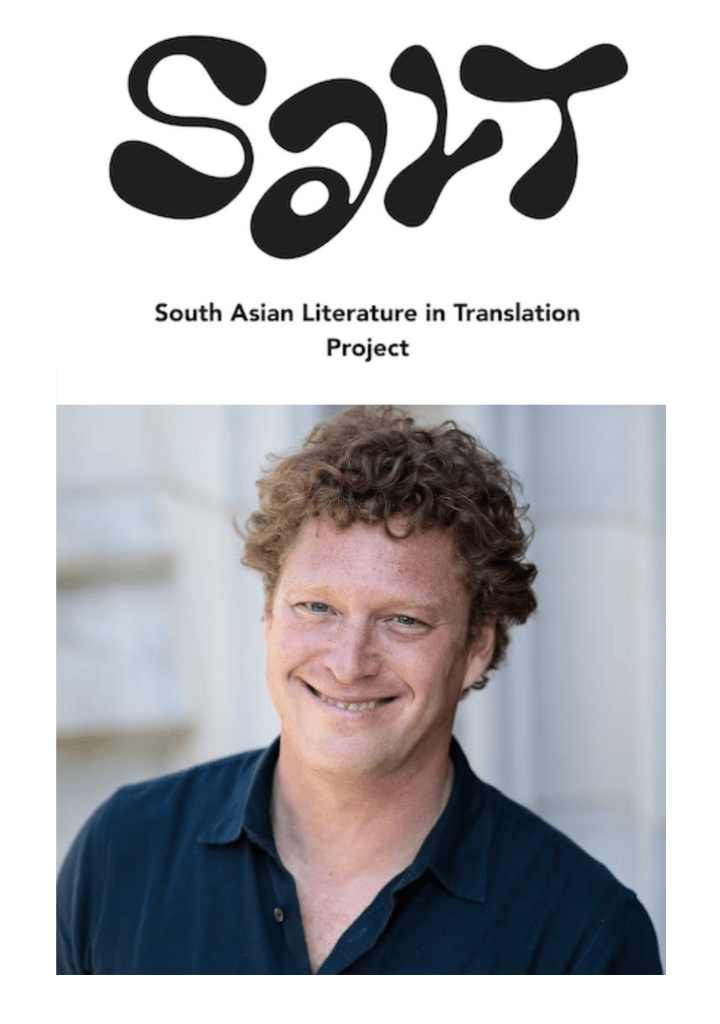Q: Congratulations on the launch of the SALT Project. Can you provide a brief summary of the project and its goals?
Thank you! The project’s origin lies in many missing books. In particular, only 64 books translated from all South Asian languages have made it to US bookshelves over the past ten years—and 64 is a generous figure. This represents less than 1% of all translated literary works published in the US, despite South Asia accounting for about a quarter of the world’s population. Not to mention the many rich literary traditions of languages like Bangla, Hindi, Marathi, Sanskrit, Tamil, and Urdu, just to name a handful of the languages we teach here in SALC. There are so many “missing” books and voices and writers—”missing” in the sense that to not exist in English is, unfortunately, almost like not existing at all.
The goal of the SALT Project is to help these writers and voices join the international conversation of literature by making strategic interventions in the ecosystem that fosters the journey of a book from one language into another. This means every link in the chain: translator training, discovery and acquisition, publishing support, and book promotion. Concretely, our goals include supporting the translation of over 40 books from South Asia—from at least 16 languages—and providing substantial individual training for over 40 translators. These are books that otherwise wouldn’t be published, and translators who otherwise wouldn’t have access to training and mentorship opportunities.
Q: When and how did you first become interested in South Asian literature and translation?
As an undergrad, I majored in Comp Lit with a focus on translation, and South Asian Studies, and I’ve always enjoyed writing. So when I learned Hindi, all of these things came together. I also took a course on classical Indian literature as an undergrad where we read A.K. Ramanujan’s translations from Tamil, and that got me hooked as well.
Q: How did you go about building the program and its goals?
I owe a lot to my SALT Project co-director Daniel Hahn, who first approached me last summer about collaborating on this project. Danny is a “translator’s translator,” and has helped design and run programs in the UK similar to what we’ll be doing here with SALT. Danny has an incredible breadth of experience building literary initiatives like SALT.
We first conceived of the different aspects of the project that holistically address the ecosystem in a way to achieve our goals. Then we worked on structuring a multi-year plan that distributes the project components in a strategic manner. Since none of the project’s goals can be achieved without high-caliber literary translators, we emphasize translator training most heavily early in the project. In the summer of 2024, we’ll host the first ever translation summer school devoted exclusively to South Asian languages—Summer SALT—here at UChicago. In subsequent years, when more books fostered by SALT will be coming out, the project components related to publicity come more into focus.
Q: What challenges, if any, did you face when advocating for the creation of the SALT Project?
There weren’t any major challenges, and it’s been so heartening to see how well the project has been received both on campus and in the world.
Q: What are your biggest hopes for the program’s first year?
Our hopes for the first year are twofold. One, to host a successful summer translation school—Summer SALT—for emerging translators of South Asian literature. We want people to look back on all the books that we hope to come out of this cohort, and say that this is where it all started. Two, to amplify the message that UChicago is *the* place in the world where all things related to South Asian literature in translation are happening.
Q: What advice would you give to students and researchers interested in South Asian literature and translation?
Find writers you love who aren’t available in English, or who have been translated poorly. Translate them. Find writers you love who have been translated well into English, and study those translations. What choices did the translators make? Trace the art and process of those translators back through the two texts. Find other translators, either locally in Chicago, or online, and start a collective. (You only need two of you.) Apply for Summer SALT and the SALT mentorships that will run through ALTA starting next year. Email saltproject@uchicago.edu to sign up for our mailing list to stay up to date about the latest news and initiatives.
Q: How has your membership with COSAS helped you over the course of this project’s development?
This project wouldn’t have been developed, let alone come to fruition, if it weren’t for the enthusiastic support and sage advice of COSAS members, both present and past. I’m particularly grateful for all the help from Costas, Rashmi, Gary, and Ulrike.
